“Crickets are good luck in Cuba,”
the man tells me, as he expertly winds a palm leaf around itself, folding the plant so it begins to represent an insect. His fingers move as quickly as his mouth does.
We are in a car park just outside of Trinidad, at the base of stone steps that lead to a viewpoint looking out over the valley. All the surrounding land used to be filled with sugar cane plantations, worked by innumerable African slaves.
Already sitting in the waiting car, my Swedish friends have a knowing expression on their faces. Clearly I'm about to be asked for money in return for the palm leaf cricket. But when I try to give him back the cricket, the Cuban shakes his head. “Un regalo”, he insists, smiling. A present.
Driving through the Cuban countryside, I look at the cricket, sitting muted and patient in my hand, and think about why it might be a good luck symbol here. An insect that jumps; that sings; that moves quickly. A creature that's hard to be tamed.
I didn't know much about Cuba before I arrived. I knew the basics – school history lessons about the Cuban Missile Crisis and the Bay of Pigs, the global fascination with Che's face, and a vague awareness of the US-Cuba embargo – but not much more.
I didn't know that everyone carries umbrellas to combat the worst of the sun. I didn't know that people of all ages play dominoes together in the street, that fresh cakes are something of an obsession, and that groups of bare chested men lean against whichever wall is in the shade while they chat to any friend that passes by. I didn't know there are more public parks filled with exercise machines than with children's play equipment.
And even though I tried, I never learned the reason for the bird cages.
They hang in windows, on lampposts, from tree branches, and in the hands of young men walking down the street. They are small, modest, made from wood, and are seemingly an integral part of Cuban life.
I noticed these cages every time I saw one, because they emulated the sense of separation I kept feeling in Cuba.
Cuba, split in two
A place with a separate currency and transport system to accommodate tourists in their midst, Cuba also presents two different images of itself. On the one hand, its a time warp that satisfies the foreign-imposed romantic view of old cars, crumbling buildings, colonial towns, cocktails, and constant photo opportunities (plus never being more than an hour away from a beach).
On the other, it's a post-revolutionary country where people still get a lot of their food from government-issue ration shops, men approach tourists in the street to plead for soap and milk for their children, and heart surgeons double as taxi drivers during the night to supplement their poor wages. Recovering from the Special Period and dealing with the continuing US embargo isn't really that romantic when you're living it.
During the month I spent in Cuba, I tried my best to get to grips with this duality. Throughout, I was constantly aware of a barrier between me and local Cubans created, strangely enough, by the tourism through which I was able to visit; and still more pertinently, the outsider view of Cuba itself.
The barrier between Cubans and tourists
Life is lived outside in Cuba. It's due, in part, to the incessant heat and a constant search for a breeze – but it's also because Cubans are inherently sociable, and chatting to friends, neighbours and the occasional tourist is part of daily life.
Because of that same heat, I found myself hiding inside under the blissfully cool air conditioner on many afternoons, but Cubans are very adept at flashing the flesh to handle the heat. Men roll their shirts up over their expansive stomachs, women wear short skirts and always seem to bare their shoulders, young boys go shirtless, and naked babies tottering around get the best deal of all.
But for most of the tourists wandering through Cuba, observing the Cuban way of life is just that – observing.
As a regular tourist in Cuba, it's nigh on impossible to break out of the pre-ordained tourist bubble. The local buses, all-metal containers crammed with profusely sweating people, are exchanged for air-conditioned coaches that only serve towns and cities with some kind of tourist-friendly setup. Trying to board local buses and trains is met with a lot of difficulties – presumably so clueless tourists don't clog up the local system, but I suspect also so that there aren't influxes of tourists to places that Cuba hasn't prepared for the purpose.
Then there's accommodation: a unique system of either government-owned hotels or 'casas particulares', a type of homestay/bed and breakfast where you rent a room in a Cuban family's house. And finally, money: probably the biggest indicator of just how different life is for a tourist in Cuba and a regular Cuban. Because while tourists pay in convertible pesos (CUC, pronounced 'cook'), where the conversion is 1CUC to 1USD, Cubans use moneda nacional, at 24MN to a single CUC.
It means that touristy restaurants, attractions and accommodations are all charged in CUC, while street food and Cuban entertainment is priced in MN, creating an inherent separation between the two differing groups of people thronging the streets. It also means that while Cubans can live cheaply inside their own world, there's an opportunity to earn a huge amount more money if you work within the tourist sector.
Simply put, the continuing US-imposed embargo against Cuba, signed by US President Kennedy in February 1962, means that tourism is a huge part of an individual Cuban's income – and as a result, people focus on foreigners to an obsessive degree.
Crowds of grandmothers wave laminated placards of their homes as long-distance tourist buses pull into bus stations; gaggles of men on street corners shout the prices of taxi destinations all throughout the country at everyone who looks foreign; and you merely have to mouth the word 'cigar' for a jinetero, a Cuban tout, to appear magically beside you.
Tourists are seen primarily as a source of money, and it becomes horribly easy to assume that anyone approaching you is after something.
Then you can add in the fact that most tourists I encountered barely spoke a word of Spanish – something I found very difficult to comprehend, after so long in South America where most travellers have at least got the basics. But Cuba is an island on its own, catering to tourists on the hunt for beaches, salsa and a lot of cocktails; it's a holiday destination, not part of a longer backpacker trail, and that fact made itself very obvious to me.
I'm going to write about each of these factors in detail later, but for now it's enough to know that they all contribute to a wholly bizarre travel experience. Speaking in Spanish to Cubans was pretty much my only ace in the pack, and I used it extensively.
Going in search of Cuban conversations
When jineteros asked me for taxis, I sidestepped the question and asked for recommendations on where to walk in their city instead. I dropped about a thousand “buenos dias/buenas tardes” to the old men and women sitting in their windows, looking out on the world, in the hope of a smile.
And once I made a spur of the moment reaction to a man making the ubiquitous Latino kissing noise at me as I walked past: I stopped, turned, and asked him just why men in Latin America feel the need to do it, as it's constantly upset and annoyed me the last 18 months. Turned out he really wanted to talk, and we ended up in a full-on half hour conversation with him and his friends about the attitudes shown towards women in this part of the world.
One of my favourite conversations occurred when I was sneakily attempting to take this photo in Cienfuegos. As my friend and I walked past the bars, the body attached to these hands appeared; a tiny old woman, grinning happily from inside her house. She was called Auria, and immediately started talking at such a quick speed that she gave the impression she didn't often chat to strangers.
Auria had lived in the same house for forty years and was ninety years old, she said, but had a memory as sharp as anything. “I know forty poems by heart, they're all in my head,” she said. “Would you like to hear one?”
Without waiting for an answer, she launched into a recital, the narrator referring to their lover as the stars and the moon. She didn't stop talking for a good ten minutes while we glanced up at the thunder rolling above her house, the daily Cuban storm threatening to hit at any moment.
When we eventually walked away, we'd heard Auria's life history – and that of her two grown up sons – and had our hands grasped, cheeks kissed through the bars, and the promise that had a Cuban grandmother in Cienfuegos. More than that, though, all I could think was how happy she seemed to finally have someone to talk to, through the bars that separated her from the street outside. Seemingly content in her own little bubble, but still desperate for a chance to communicate.
Dealing with a lack of internet in Cuba
For tourists in Cuba, there's an immediate awareness of being separated from the rest of the world. Due to a combination of meagre funding, tight government constrictions and the US embargo (no surprises there), Cubans have remarkably little access to internet – and in an age where travellers are perpetually connected via social media and the ability to Google anything and everything, it's a very odd experience to be forcibly disconnected.
When I met other travellers and wanted to stay in touch, there was no internet to rely on – not even mobiles, as it's virtually impossible to get a Cuban SIM card as a tourist. Instead, there was a laborious process of writing down casa addresses and phone numbers, then being handed the phone by casa owners with the words, “es tu amiga,” when that friend phoned to arrange what we could do the next day. I took word-of-mouth recommendations for where to stay and what to see – and obviously couldn't spend my free time checking emails.
A few Cubans I talked to were adamant that the internet wasn't a huge void in their lives. “We don't need it here – but it does affect what we know,” said my casa host in Camaguey, a lawyer. He said that a lot of people in Cuba don't know much about the rest of the world, correlating information pieced together from different conversations with travellers: a few words from a Japanese casa guest, a discussion with a Swiss guy, chatting to a German on the street.
A music producer said it was sometimes frustrating, the lack of internet, because it affected his job. “Most bands I work with only play in Cuba,” he said, as we queued up for peso pizza in a Santa Clara street. “They don't have an audience outside.”
There's definitely a sensation that you're apart from the outside world in Cuba, and I still don't know if that's a good or a bad thing. I'm so inherently used to having the internet as a research tool, so the lack of freedom in Cuba to look at multiple sources and reach a conclusion about any given topic is deplorable to me – although it's likely a vast amount of people with constant access to the internet don't actually do this. But they still have the ability: Cubans don't.
Interestingly, a lot of the more negative opinions of the country came from people in professions I'd assume were more well paid – Cuban doctors, lawyers, university professors. The Cuban literacy level is at 99% after Castro's new government implemented a wildly successful literacy scheme to get the country reading in 1961.
And yet I stayed with a middle aged woman in Cienfuegos who prefers running a casa with her parents than her university job because the money is better. The Camaguey lawyer told me, his eyes wide behind thick glasses, that there's a class system in Cuba now. That doctors and bankers huff and puff, riding their bicycles to work, while prostitutes get air conditioned cars. When I questioned that this class system was only based on money, surely, he rubbed his fingers together.
“That's all that matters – money,” he said.
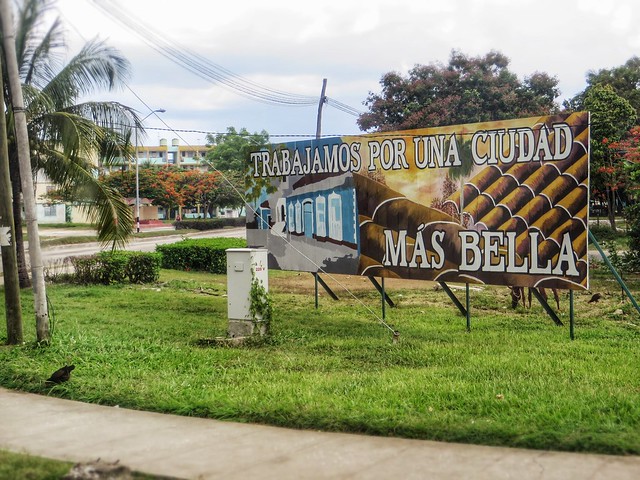
These slogans are everywhere in Cuba: we work for a more beautiful city. Except are they all working together?
With each conversation, I switched my opinions about how Cubans really feel, living the way they do. I talked to former revolutionary fighters and casa cleaning ladies who bristled with pride about their government. “Everyone has the same amount of money, more or less,” said Hugo, who fought under Che in Santa Clara, and talked about the Argentinian with tears in his eyes. “Nobody is hungry – we all have food,” said Maria, as she served me breakfast in Havana.
It's difficult to know what to think. A lot of the time, I was uncomfortably aware that the local CDRs – neighbourhood groups, named 'Committees for the Defense of the Revolution,' that effectively keep tabs on the local happenings – have eyes and ears everywhere, and I never knew if wholly positive statements were being said, extra loud, for the benefit of anyone who might be eavesdropping.
Then again, it's always easy to assume there's something dramatic going on behind the scenes.
Regardless, there's undebatable evidence of Cuba's continuing devotion to the revolution, and many people's love for the Castro government. Every highway is littered with propaganda billboards carrying famous quotes and recognisable images of Che, Fidel and happy revolutionaries.
It's more subtle, too; a wooden plank hoisted on a train station lamppost with the words 'viva Fidel y Raul'; a Che tattoo on a man's bicep; the finale of a dolphin show closing with tiny Cuban flags in the dolphins mouths.
And now there's a relatively new cause to champion; five Cuban men who have been serving out their life sentences in United States prisons for spying charges since 1998, and who the entire nation has clearly rallied around to protest their innocence, and their right to return home.
Yellow ribbons are accompanied by photographs of the Cuban Five stuck on spare patches of wall, stapled to front doors, tightly tied onto electrical wires in the street. The ribbons are even more pertinent when you realise there are almost enough to rival the nationwide markers to the revolution.
Trying to make some sense of Cuba
I left Cuba two days ago, and I'm still processing exactly what I think of the country. For me, visiting Cuba was a challenge. I wanted to get to know the people as much as I could, and while I certainly had a fair amount of Cuban conversations, there was a lot I missed out on because I simply couldn't find a way to infiltrate that side of Cuban life.
Everywhere I went, I was met with barriers. Sometimes it was my status as a tourist, which meant I clearly had money. Other times it was the oppressive midday heat, confining me to a place with airconditioning, or it was because I didn't have enough time to really talk in depth about the topics I wanted to. But I was still welcomed into various facets of Cubano life – and I like to think I was observant enough to notice all the myriad of details, too.
The constant sense of movement in the streets, on the balconies, people shouting and laughing and singing. The old men playing intense games of dominos in the way of passing traffic, the bargaining for meat at the butchers, the kids hitching rides on the crossbar of their friend's bicycles. Women gossiping under umbrellas, men chilling out in their horse drawn carts, pensioners staring out from balconies.
And occasionally, taking a nap when things get too much.
Have you been to Cuba? Did you feel the same way I did, or do you have a totally different opinion of the country? I'd love to hear what you think!

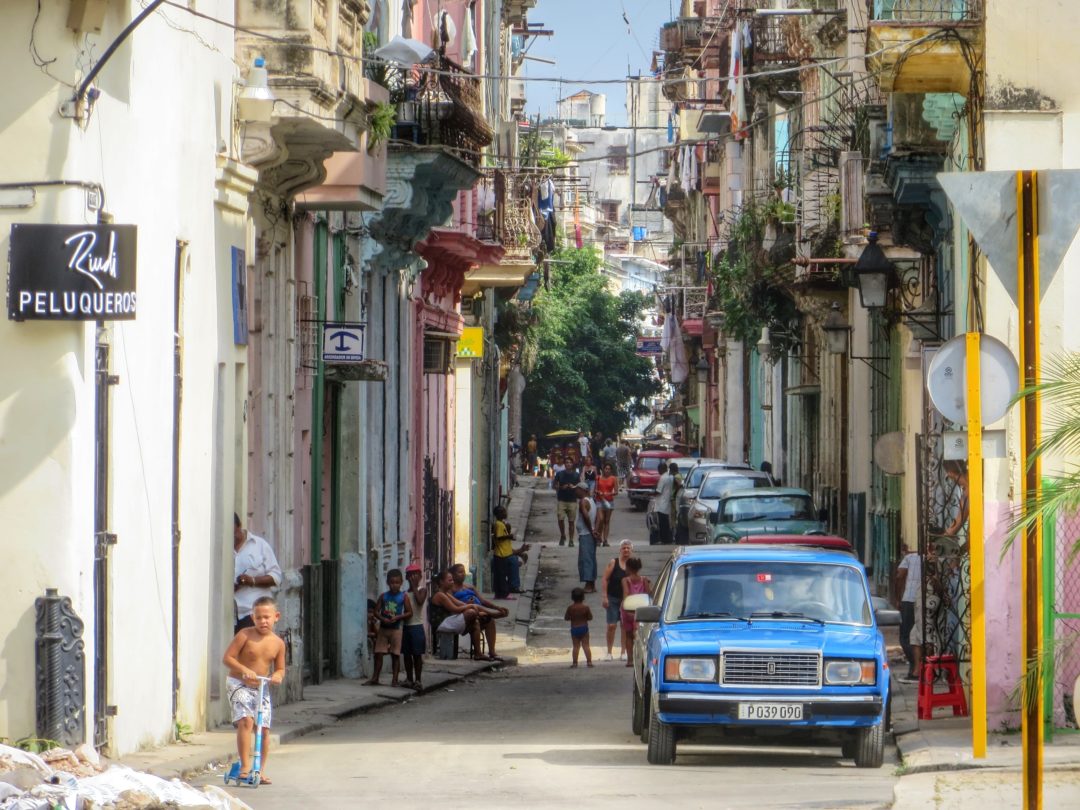
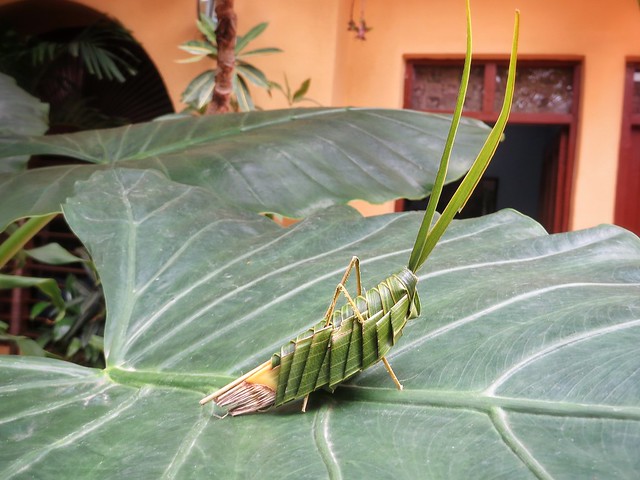
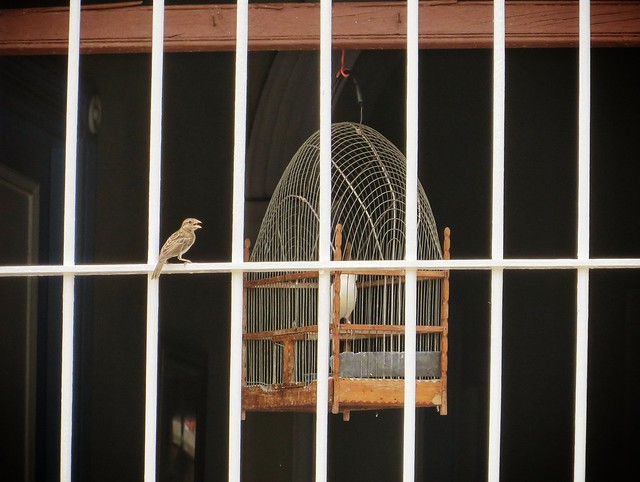
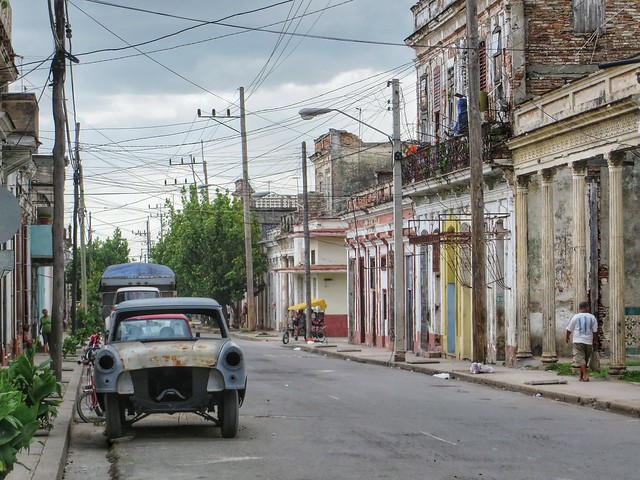

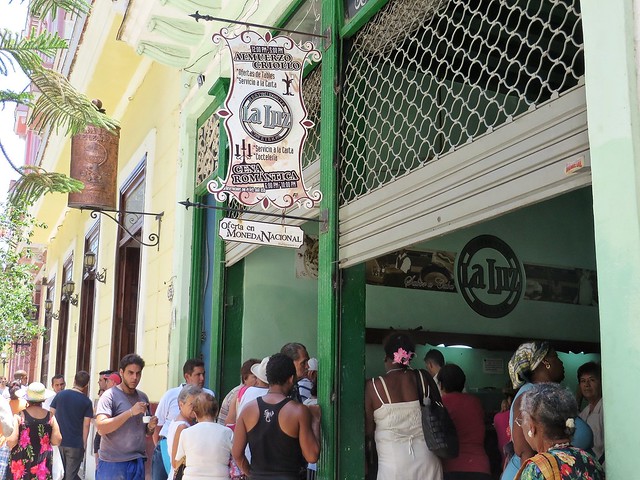
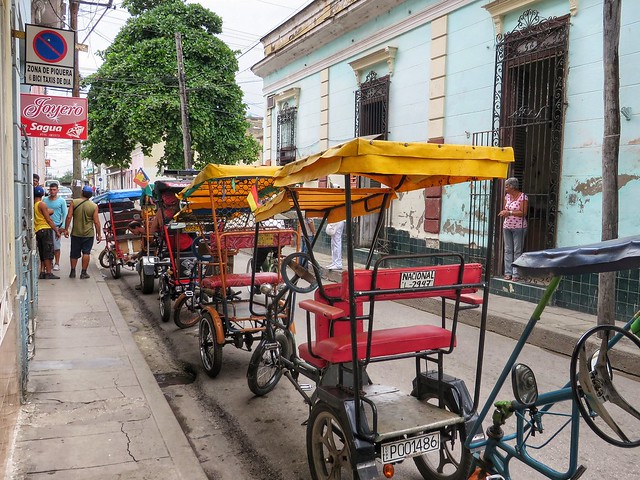
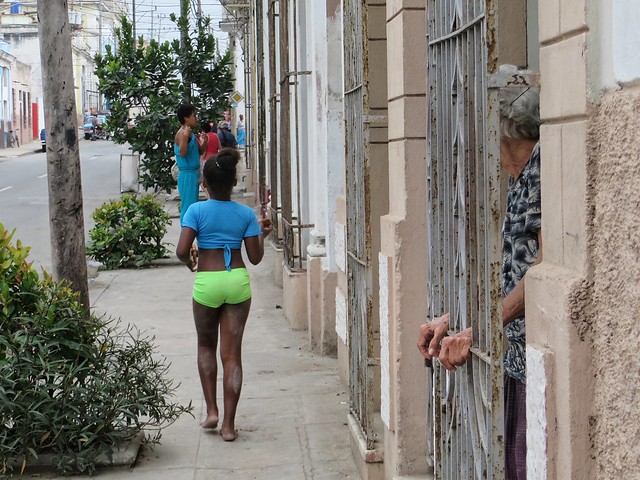
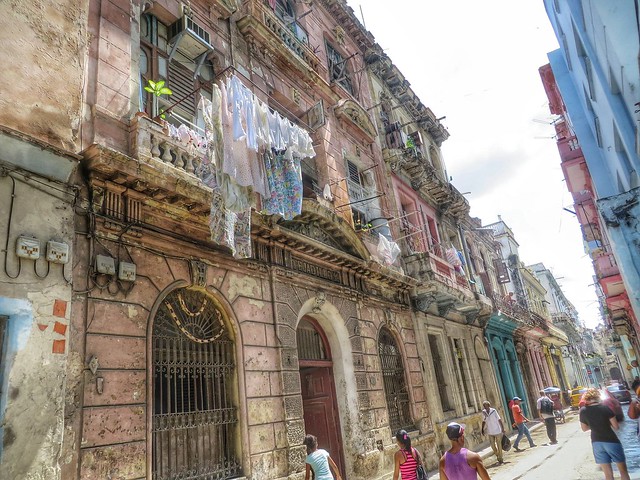

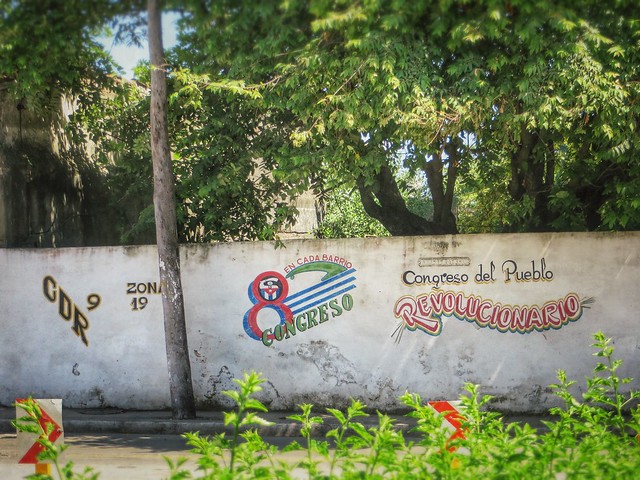
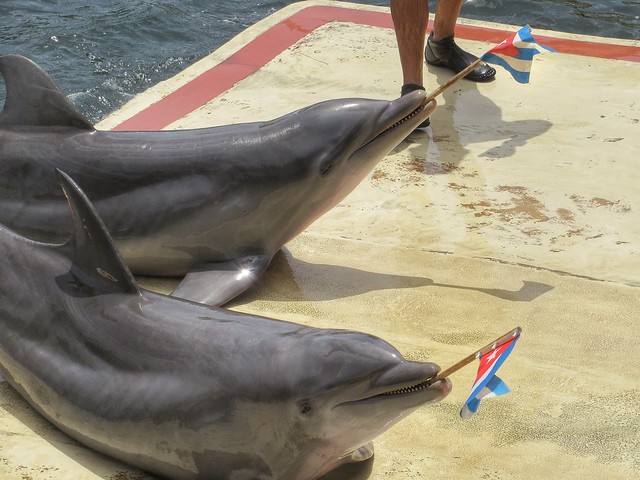
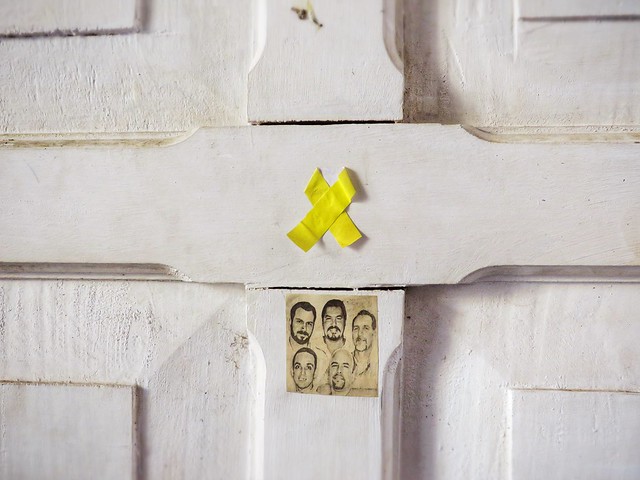
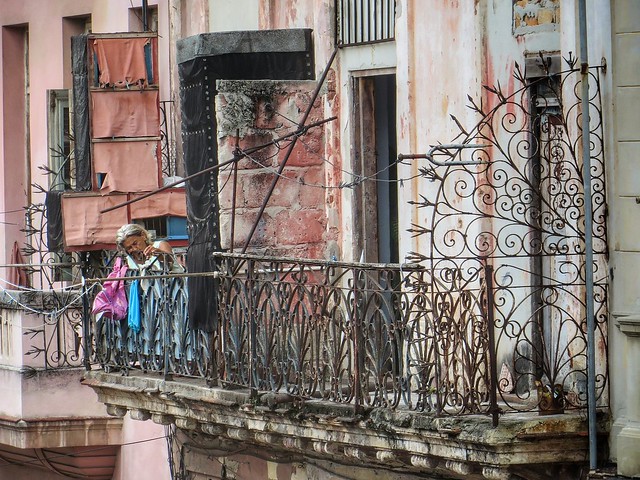
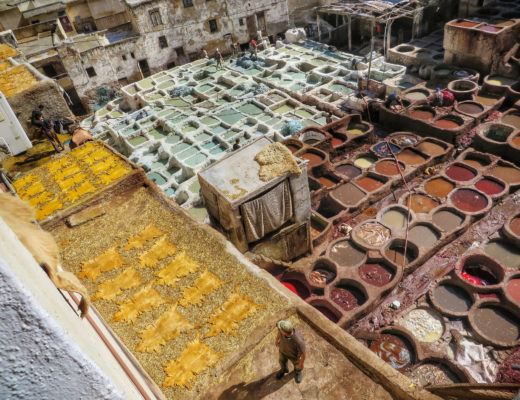
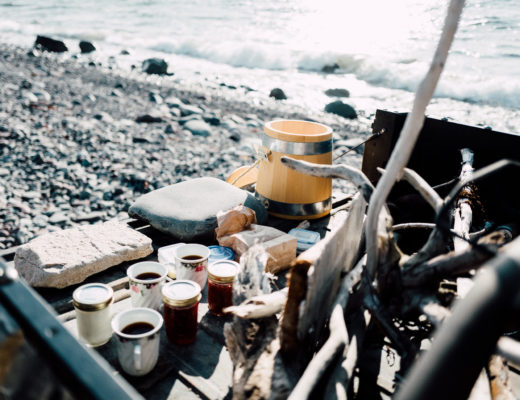
38 Comments
Gary Cartzdafner
July 10, 2014 at 5:46 amHello Flora. It sounds like you had a “hot” (literally) time in Cuba. I look forward to seeing more of your pix and additional Cuba writings. I haven’t been there yet, but its on the list. Keep up the great writing. You turned me on to Colombia and Pablo in Medellin, and Im missing it to this day…I loved it there. Especially living in the hostel on a coffee plantation…….Thanks again….Gary
Flora
July 11, 2014 at 2:00 amGlad to hear you’ve got Cuba on the list now, Gary! And did you stay at La Serrana in Salento too?? Wonderful place, huh?
Nikita
July 10, 2014 at 11:02 amI’ve heard other travellers talk about that same divide. I feel like that’s something that would really frustrate me, but wouldn’t deter me from visiting Cuba. It looks like a beautiful, if confusing, country. I’m looking forward to reading more about it!
Also, good on you for questionning that man about the kissy noises situation. I’d be really interested in hearing what he had to say!
Flora
July 25, 2014 at 8:31 pmI’m planning to write in more detail about that conversation Nikita!
Andrea Anastasiou
July 10, 2014 at 11:41 amBrilliant piece. I’ve wanted to visit Cuba for years and I’m finally getting to go next year. This post kind of echoes everything else I’ve read about the place. I’m so intrigued by it all. But one thing is for certain; I’ll be learning some Spanish before I make it there!
I guess if you don’t know the language you will feel even more separated from it all…
Flora
July 25, 2014 at 8:33 pmHaving the ability to speak Spanish in Cuba made a more pronounced difference than in any other Latin American country I’ve been to so far. I think it’s a really good idea to learn the language if you want to really get a more in depth experience!
Lorenzo
July 10, 2014 at 1:06 pmExcellent piece, this is exactly how I felt when I was in Cuba. You forgot to mention that the food is ridiculously bad…or maybe that’s just me. I totally didn’t expect that before going.
But overall, I loved being challenged by Cuba and will def go back one day.
Flora
July 25, 2014 at 8:55 pmOh god, the food really was terrible! Luckily the country had some other positives..
Ann
July 10, 2014 at 1:30 pmagree with your observations. i went to Cuba in Feb. and am still processing everything! i also struggled with the divide between Cubans and tourists.
Flora
July 25, 2014 at 8:55 pmMe too — it’s insane how much of a impact travelling in Cuba had on me!
Ben @ Road Affair
July 10, 2014 at 4:41 pmAwesome post. Now I definitely wanna go to Cuba and experience it for myself. I have read and heard quite a few things about Cuba but I am still not sure what to think about the political situation there.
It seems like you still on the fence even after staying there for a month, so who knows if visiting it will give me some clarity or confuse me even more 😉
P.S. love the picture of the palm leaf Cuban cricket. I have never seen one before.
Flora
July 25, 2014 at 8:57 pmYeah, I think I am on the fence still.. It’s such a complex place to visit and it definitely takes time to get to grips with your feelings!
Amanda
July 10, 2014 at 5:21 pmFantastic post, Flora – possibly one of my favorites you’ve written. As an American traveler, Cuba has always fascinated me, and I’m not sure if it’s because it’s “forbidden,” or if it has more to do with the duality you mentioned experiencing there. Either way, I really enjoyed reading this, and can’t wait to read more about your Cuban travels.
Flora
July 25, 2014 at 8:58 pmThanks so much Amanda! I can totally imagine the forbidden temptation of Cuba for Americans. I still met quite a few travelling there though..!
Jessica (Barcelona Blonde)
July 10, 2014 at 8:25 pmBeautiful post and photos. I’ve never been to Cuba, but from just this it sounds like such a fascinating country.
Flora
July 25, 2014 at 9:06 pmThanks Jessica!
Ed Graham
July 11, 2014 at 2:31 amReally interesting take on a place that is elusive for us Americans. Thanks Flora.
Flora
July 20, 2014 at 6:37 pmHopefully you’ll make it there eventually regardless of the American restrictions, Ed – you’d love it in Cuba!
Katie @ The World on my Necklace
July 11, 2014 at 4:08 amFlora, this is an excellent post. It seems like you have a greater understanding of the duality in Cuba that most visitors would. It sounds like such a contradictory but thoroughly interesting (and beautiful) place and I would love to go there some day
Flora
July 25, 2014 at 9:57 pmThanks so much Katie!
Sasha @ The Curious Zephyr
July 11, 2014 at 10:26 pmI would love to hear more about the conversation that followed from the guy harassing you on the street! Sounds like it was a positive outcome that you stopped to ask him why!
Flora
July 20, 2014 at 6:38 pmI’m planning to write at length about that experience/conversation Sasha, don’t you worry!
Claire
July 12, 2014 at 2:50 amI’m glad you wrote about your conflicting responses to visiting Cuba. Too often I feel like Cuba is romanticized or idealized because of it’s history and isolation. Doesn’t deter me from wanting to visit, but it’s good to know what kind of things to expect.
Flora
July 25, 2014 at 10:00 pmI think a lot of people find it difficult to ruin that romantic image of Cuba. Thing is, there are a hell of a lot of issues and I, for one, actually found it hard not to write about them!
Jo
July 12, 2014 at 11:36 pmAwesome insight into Cuba Flora, we love to get down and local, seems it will be more of a challenge in Cuba, but lets see.
Flora
July 25, 2014 at 10:01 pmAre you off to Cuba soon? Have a great time Jo!
green coffee beans for weight loss
July 15, 2014 at 9:41 amI almost never comment, however after reading a few of the
remarks on Impressions from Inside Cuba. I do have 2 questions for you
if you do not mind. Could it be simply me or do some of these remarks appear
as if they are coming from brain dead folks? 😛 And, if you are writing
on additional social sites, I would like to follow anything new you have to
post. Could you make a list of every one of
your social community sites like your twitter feed, Facebook page or linkedin profile?
Zoe @ Tales from over the Horizon
July 18, 2014 at 3:40 amIt was really interesting to read your take on Cuba. So little is heard about the country generally. I went to north Korea last year and it was really interesting.
Flora
July 25, 2014 at 10:03 pmThat must’ve been really fascinating, Zoe!
Andreas Moser
July 22, 2014 at 6:46 pmDid anyone notice the irony of championing the release of the Cuban Five when Cuba itself imprisons opposition and human rights activists and journalist?
I also feel like you are blaming too much on the US embargo, which after all doesn’t affect trade between Cuba and the other 199 or so countries in the world, while I din’t see any mentioning that Cuba itself is a dictatorship and that their economic policies might be a mess. First they tied their national economy to the Soviet Union and then to Venezuela, both countries with anything but a sustainable economic policy.
Taylor Hearts Travel
September 1, 2014 at 12:10 pmSuch a good write-up, Flora. I really enjoyed reading about your experience and learning about Cuba. I haven’t been yet, but it’s somewhere that I’m definitely curious to visit. Thanks for sharing your insight!
Flora
September 26, 2014 at 12:23 pmYou’re welcome Taylor – glad you enjoyed it!
Julia
September 5, 2014 at 12:38 pmFlora, this is a great article. I was thinking about going to Cuba and did some research; it is hard to believe that the access to Internet is so restricted. But I assume that the travel experience is way different because one simply doesn’t run around with a phone connected to facebook and twitter the whole time. I really like your style of writing!
Flora
September 26, 2014 at 12:36 pmThanks so much Julia – glad you enjoyed it!
Orlys
September 8, 2014 at 4:23 pmHello flora I’m cuban and I live in Florida and I just wanted to say to you that what you just published is very important to me I’m happy that people around the world can get to see what Castro and it’s government have done to the beautiful island of cuba. Internet electronics and certain technologies are always been stricted clasified from even doctors over there but keep up the good work and thank you for showing all this one my country cuba will change thank you
Flora
September 26, 2014 at 12:38 pmThanks so much Orlys – I’m really glad I did a good job of conveying some truths about Cuba for you 🙂
How to Travel in Cuba on the Cheap
January 30, 2015 at 12:38 am[…] summer I spent a month in Cuba, trying to explore as much of the island as I could: from the sensory bombardment of Havana to the […]
My favorite 15 Travel memories from 2015!! | Pinch of Adventure
January 11, 2016 at 2:09 am[…] blogger wrote about all the barriers visitors experience in Cuba… and I keep thinking back to that post in agreement. Cuba was like no other country I have […]